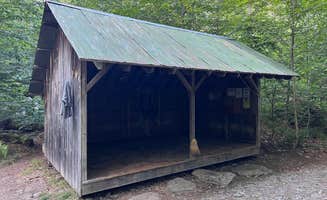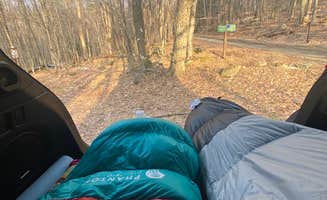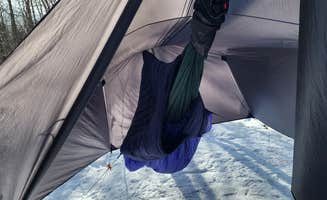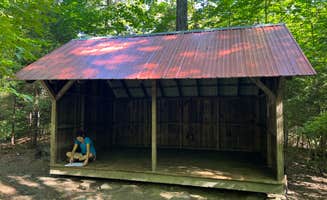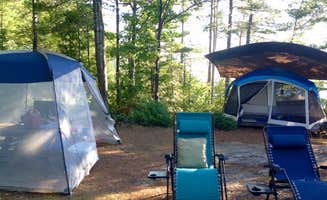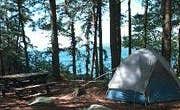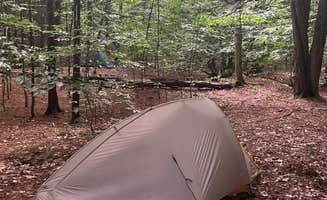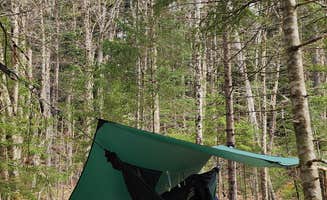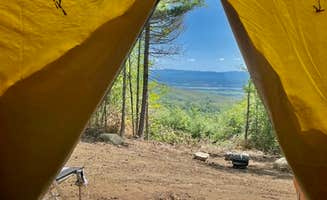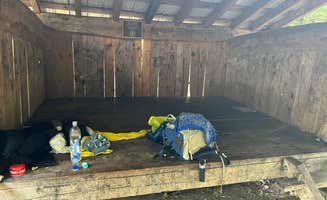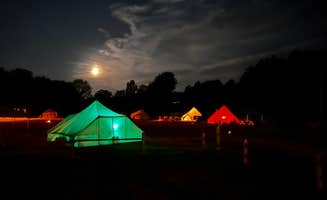Tent campsites near Wallingford, Vermont offer natural, secluded alternatives to developed campgrounds throughout the Green Mountain National Forest. Most sites sit between 1,500-2,500 feet elevation, with terrain characterized by hardwood forests, mountain streams, and rocky outcroppings. Summer temperatures typically range from 50-80°F with nighttime temperatures dropping significantly even in July and August.
What to do
Hiking on Stratton Mountain Trail: Access excellent day hikes from Stratton Pond Shelter, where trails connect with both the Appalachian Trail and Long Trail. One camper noted, "The shelter is a 3.75mi hike from the nearest parking lot in winter. The lake looks great and is one of the largest bodies of water on the Long Trail."
Swimming in natural pools: Find swimming opportunities along Michigan Brook, with multiple riverside tent sites available. According to a visitor at Michigan Brook, "Drive in about a mile after the parking lot!! Can use car to get in! There's 3 camping spots. 1 before the bridge and 2 after the bridge! The one before the bridge that's right next to the river is the best one!!"
Fishing in local ponds: Little Rock Pond offers excellent fishing opportunities with tent platforms nearby. A camper described it as, "Easily my favorite campsite in the Northeast! Operated by the Green Mountain Club caretaker who lives onsite, this campsite costs only $5 per person per night."
What campers like
Pristine backcountry water features: Stratton Pond Shelter offers access to significant water resources uncommon at this elevation. A visitor mentioned, "The lake looks great and is one of the largest bodies of water on the Long Trail."
Affordable wilderness camping: Many sites throughout the region provide low-cost or free tent camping options. At Little Rock Pond, a reviewer highlighted the value: "This campsite costs only $5 per person per night. There's a big 3-wall cabin with room for at least 12, several tent platforms, and there's even a composting privy (#2 only)!!"
Wildlife viewing opportunities: Common Loons and other wildlife frequent the ponds near tent camping areas. As one camper at Little Rock Pond Group Camp & Shelters noted, "The pond is surprisingly warm for its altitude and it's home to two Common Loons."
What you should know
Vehicle requirements for dirt roads: Most forest service roads require higher clearance vehicles, particularly during spring and fall. A camper at Michigan Brook Road Camping advised, "Road goes in pretty far. Some parts are muddy and very rough. Higher clearance would be advised!!!"
Seasonal road closures: Winter access becomes significantly limited or impossible for most camping areas. One visitor explained, "This area is open for camping year-round but probably only accessible in Spring through early Fall because the dirt road is not plowed."
Limited communications: Cell service is extremely limited throughout the camping areas. A Michigan Brook camper warned, "PLEASE NOTE: THIS LOCATION DOES NOT PROVIDE CELL PHONE SERVICE OR WIFI CONNECTION. However, if you walk to the end of upper Michigan Brook road you will have cell phone service and a gas station."
Tips for camping with families
Accessible swimming spots: Look for tent sites near natural swimming holes appropriate for children. A visitor to Winturri Backcountry Shelter noted, "Water was running when I was there in mid-August from a spring close to the shelter."
Shelter alternatives: Many backcountry sites offer both tent camping and shelter options for flexibility with children. According to one camper, "The shelter was fairly standard but this stop had a great amount of tent camping around in spaces with decent privacy."
Wildlife awareness: Prepare children for inevitable wildlife encounters, particularly raccoons and small mammals. Multiple sites throughout the region have established bear boxes for food storage, an important safety feature when camping with children.
Tips from RVers
Limited dispersed RV options: Only a few roads allow for RV access beyond traditional campgrounds. A camper at Last light on Michigan Brook shared, "Love this site! The very last spot on the right hand side. If you've reached the closed gate you've missed the site!"
Spring road conditions: RV drivers should avoid dirt road access immediately following snowmelt. A visitor warned, "Beware that in Spring the road gets muddy and quite rutted, I would not recommend driving down there with a car that is low to the ground."
Year-round considerations: Winter camping with RVs is generally not possible on most forest service roads. One visitor attempted winter access and reported, "I attempted to bring my car and was stuck overnight but was able to dig myself out the next morning."


